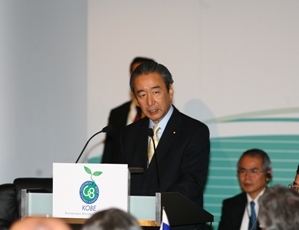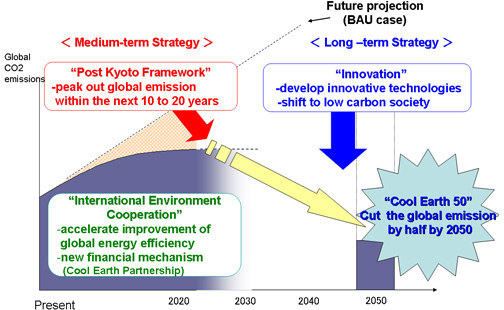
Ministerial-level discussions at the Kobe Meeting focused on 3 main themes: Climate Change, Biodiversity and the 3Rs
Chair's Summary[PDF]
 Climate Change
Climate Change
Climate change is one of the greatest challenges of the 21st century. At the Heiligendamm Summit held in Germany in 2007, then Prime Minister Shinzo Abe introduced to the G8 heads of state Japan's proposal of "Cool Earth 50," resulting in agreement by the G8 leaders to consider seriously at least halving global greenhouse gas emissions by 2050. As the chair of this year's G8 Summit, Prime Minister Yasuo Fukuda presented his "Cool Earth Promotion Programme(*)" at the Annual Meeting of the World Economic Forum in Davos in January 2008.
Building upon this Programme, the ministers at the Kobe Meeting, discussed the effective means of mitigating climate change, addressing such main issue as:
①Transition to low-carbon societies for the achievement of long-term goals
②Cooperation among developed countries and developing countries
③Post-2012 Framework
Chair’s summary was issued on the final day as an outcome of the discussions at the Meeting.
Outline of the Chair’s Summary on Climate Change
Transition to Low-carbon Societies for the Achievement of Long-term Goals
●Strong political will was expressed to reach agreement on the goal of reducing GHG emissions by at least half by 2050 at the G8 Hokkaido Toyako Summit. It was noted that in order to halve global GHG emissions, developed countries should take the lead in achieving a significant reduction.
●To realize long-term goals, transition to low-carbon societies is necessary. In so doing, there was general recognition of the importance for all the countries to have a clear vision of low-carbon societies.
Post-2012 Framework
●The need was expressed for effective mid-term targets which take into account the findings of the IPCC.
●Bearing in mind the principle of common but differentiated responsibilities and respective capabilities, developed countries must actively adopt measures to reduce GHG emissions, while it is especially critical for countries with rapidly increasing GHG emissions to strive to curb the rate of increase.
●The effectiveness was confirmed of using sectoral approaches to set quantified national emission targets. In setting the targets, environmental integrity should be ensured.
Use of Economic Instruments
●The view was shared that economic instruments, such as emissions trading and environment tax, could assist in setting a price for carbon and constitute a critical set of instruments for the greater reduction of GHG emissions. It was recognized that countries should further explore possible utilization of these economic instruments according to their own national circumstances.
Cooperation among Developed Countries and Developing Countries
●It was recognized that developing countries need support from developed countries in the areas of promotion of co-benefits approach, mainstreaming of adaptation into development policies, finance, and capacity building.
Kobe Initiative
●There was wide support to follow up on the outcome of this meeting as the “Kobe Initiative,” involving establishment of an international research network on low-carbon societies and also a continuation of dialogues among major economies.
“Kobe Initiative”
The initiative aims at holding a meeting together with the outreach countries as a follow-up from the Environment Ministers Meeting. Main issues to be addressed are found below.
①International research network on low-carbon societies
②Analysis on bottom-up sectoral mitigation potentials
③Promotion of co-benefits among relevant policies
④Capacity building support for developing countries on inventories and data collection (measurability, reportability, and verifiability [MRV])
Main Points of the Chair’s Summary on Climate Change[PDF]
Keynote Speech by Ichiro Kamoshita, Minister of the Environment of Japan, in the Session on Climate Change[PDF]
* Cool Earth Promotion Programme
The Cool Earth Promotion Programme is a concrete action plan to bring about the halving of global greenhouse gas emissions by 2050, as stated in the "Cool Earth 50" initiative, proposed by Japan in 2007. This Programme will be implemented through 3 parts: a Post-Kyoto Framework, International Environment Cooperation and Innovation


